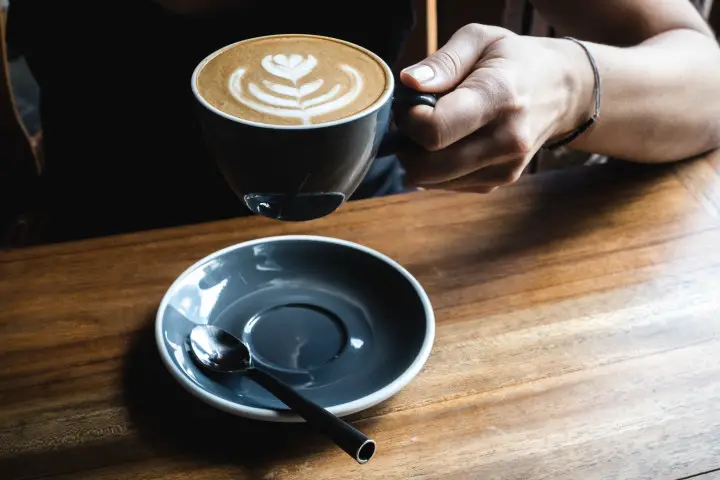Last Updated on August 9, 2023 By Emma W. Thomas
Folgers coffee tastes bad mainly because it uses a different blend of beans than other brands. Some people find Folgers coffee bitter due to robusta beans. Brewing at recommended ratios (1-2 tbsp per 6 oz water) and using clean equipment can help improve the taste.
Why Does Folgers Coffee Taste Bad?
Despite Folgers Coffee being one of the most recognized brands in the U.S., some coffee enthusiasts frequently express dissatisfaction with its taste. In exploring the reasons behind this, it quickly becomes clear that it boils down to several key factors:
1. Low-Quality Beans
Folgers primarily use a type of coffee bean known as Robusta. While this species tends to be more resistant to pests and diseases and boasts higher caffeine content, it lacks the nuanced flavors found in the higher-quality Arabica beans. The subtle bitterness and deeper richness distinguishing Arabica beans from Robusta are largely missing in Folgers Coffee.
2. Over-Roasting
Folgers Coffee is often criticized for its overly bitter and burnt taste. This is typically attributed to over-roasting the coffee beans, a process that can sometimes be used to mask the flavor of low-quality beans. Over-roasting can result in a harsh, charred flavor, detracting from the overall taste profile a good cup of coffee should have.
3. Instant Coffee Production
Many varieties of Folgers Coffee are instant, which means they undergo an additional process to convert them into an easily-soluble form. While convenient, this process often compromises the flavor, leading to a more artificial taste compared to fresh-ground coffee.
4. Storage and Packaging
The way coffee is stored can have a significant impact on its flavor. Folgers Coffee is primarily packed in large, plastic containers that may not provide an entirely airtight seal. Over time, oxygen exposure can degrade the coffee’s flavor, making it taste stale.
5. Mass Production
Being a mass-produced product, Folgers Coffee often lacks the careful control over quality that smaller, specialty coffee brands have. The emphasis on quantity over quality could result in inconsistent flavor profiles, thus impacting the overall taste.
| Reasons | Explanation |
|---|---|
| Low-Quality Beans | Folgers generally utilize Robusta beans, which lack the nuanced flavors of Arabica beans. |
| Over-Roasting | Over-roasting the beans can lead to a bitter, burnt taste. |
| Instant Coffee Production | The process to make instant coffee can compromise the flavor. |
| Storage and Packaging | Prolonged exposure to oxygen can cause the coffee to taste stale. |
| Mass Production | Folgers may not have stringent quality control, leading to inconsistent flavor profiles. |
Bad Coffee, And Why Is It So Liked?
For many years numerous international brands have come up with their version of coffee beans that have catered to a range of taste buds with varying tastes. But a growing trend has been observed, especially since the turn of the millennium that more and more people are deviating towards a rawer, cheaper, and stronger version of coffee. The smooth taste that once was a necessity for coffee blends to perfect is now simply a luxury option for adding varieties. Although flavor loyalists still crave their smooth version of cappuccino, the strong coffee has gained quite an impressive customer base.
This has allowed many brands to conjure a tasteless, aromaless version of cheap coffee and market it simply as a stronger blend of it. Coffee lovers worldwide got carried away by the convenient cost option and found a strong taste that can be passed away as the latter version of great coffee. As more people start enjoying a bitter and muddier version of coffee, the term “regular coffee” has gained good popularity across cafes. Dark-roasted, instant coffee that might not necessarily be of a superior blend has gained immense popularity, which has helped both ends of the consumer-producer arc enjoy coffee at a more convenient rate.

Coffee Brands That Are Best Avoided.
Choosing a good brand of coffee has become an arduous task in the modern day. With so many coffee brands actively selling their coffee breed offline and online, people are simply spoilt for choice. The majority of people consider only two aspects when choosing their favorite coffee brand, taste, and price.
Yet, when it comes to coffee buying, a few more facets must be considered. There are a few coffee brands out there that are termed “dirty,” mostly due to the harm they might be doing to the consumer’s health and our Earth. The list provided below mentions a few of those coffee brands that are best avoided. The aspects considered in these cases are coffee bean picking methods, coffee quality, sustainability practices, usage of harmful pesticides and chemicals, ethics, and best practices of the company.

1. Maxwell’s House
Let us start with an American Classic, a brand owned by Kraft named Maxwell’s House. Over the years, it has managed to culminate its customer base, and even a small portion of them swears by Maxwell’s House and wouldn’t drink any other coffee. But this brand is guilty of consistently rejecting every certification of sustainability and fair trade. It also does not produce anything organic, rather simple chemical molds and brews. All their coffee varieties are pre-ground items. Freshness is never observed in them. It is better to stay away from Maxwell’s House coffee and its fans.
2. Dunkin Donuts
Another popular coffee brand that started as a Coffee shop chain is famous for its whole bean and ground varieties of brew. Almost all of their outlets have become Rainforest Alliance certified, which accounts for nearly 30 percent of their dark roasted beans. However, the remaining can be sourced out from anywhere, and that remains a cause of concern. Much like Maxwell’s House, they do not have any organic variety, and hence their blend is most likely to be subjected to a host of chemicals and molds. In fact, Dunkin Donuts coffee stores are owned by the same owner as Folgers, J.M.Smucker.
You can alternatively opt for Mount Hagen Organic Fair Trade Instant Coffee.
3. Nescafe
Well, this might ruffle some feathers, especially in the Indian Subcontinent but let’s get the elephant out of the fridge, shall we? The giant multinational coffee brand owned by Nestle is the go-to option for numerous instant coffee lovers. It has also commendably partnered with the SAN (Sustainable Agriculture Network), the common code, and the Rainforest Alliance, securing recognition from the Coffee Community that they follow every sustainability standard. All this is very good. Yet they lag in one aspect, which is not being able to provide a certified organic blend of coffee. Similar kinds of molds and chemicals are used in their coffee varieties. Their varieties consist of grounded coffee, instant coffee, and pods. Therefore, freshness again becomes a concern.
Instead, we would suggest opting for Ethical Blend coffee- an exotic blend that can be easily obtained here.
4. Café Bustello
Now let us go south and switch to a popular Latin America Coffee brand, Bustillo. It is another one of the numerous brands owned by J.M.Smucker. In fact, he also distributes it throughout the continent. This coffee brand is devoid of any environment-friendly or ethical certifications regarding the sourcing of coffee beans. Moreover, they also do not produce any organic coffee blends. With both the essential aspects going negative, it is needless to say that we do not recommend it to people. On top of that, its taste is also nothing to die for, with a chunk of the Latin population disliking its flavor.
The alternative to Café Bustello would be Illy Caffe, which is remarkably the first international company to receive Responsible Supply Chain certification.
5. Seattle’s Best
There’s an old joke regarding this brand that this should be better off being called “Starbuck’s dirty little secret.” Now, I used to laugh at it, but after having a few cups of this brand, I don’t. It’s not a joke anymore. Well, humor aside, very unlike its parent brand Starbucks which prides itself on its organic blends and ethical practices of producing coffee, its Seattle counterpart, unfortunately, fails to live up to its standards. It can be considered as Starbucks’ answer to the cheap brands of coffee like Folgers and their likely competition. Fortunately, you can find a couple of organic varieties from this brand but none special whatsoever. It’s just cheap regular coffee.
We would recommend going for Nespresso Capsules instead, which is a chain that prides itself on its recycling procedures and manages thousands of collection centers worldwide.
6. Folger’s
Let’s come to the principal contender at last. What really makes Folger’s such an avoidable option? Well, for starters, as we discussed in the beginning, it’s that course taste that most people tend to dislike. It is something that has divided the coffee community into two halves. But think again, would you want to be drinking something that one-half of the community dislikes?
Secondly, they ignore all kinds of ethical environments and friendly certifications. Their website will boast otherwise, but in reality, they do not adhere to any such standards and certifications. It’s one of J.M.Smucker’s trademarks.
Finally, the supply chain uses fungicides, pesticides, and insecticides to a large extent. Their coffee is obviously pre-ground and lacks the freshness that is desired. Moreover, they do not have anything organic.
A great alternative to Folger’s Coffee would be Don Pablo organic coffee. It is a USDA-approved brand and flaunts some remarkable online reviews.
Folger Coffee Prices and Average Weight
| Serial | Name | Weight | Price |
|---|---|---|---|
| 01 | Folgers Classic Roast Ground Coffee | 3.1 Pound | $11.06 |
| 02 | Folgers Coffee Singles Classic Roast | 1.39 Pounds | $25.4 |
| 03 | Folgers Gourmet Supreme Medium Dark Roast Ground Coffee | 1.51 Pounds | $7.19 |
| 04 | Folgers Black Silk Decaf Dark Roast Ground Coffee | 1.29 Pounds | $8.19 |
Avoidable Coffees And Their Alternatives
| Brand Name | Certifications | Organic Variety | Alternative |
| Folger’s | No | No | Don Pablo Organic Coffee |
| Seattle’s Best | No | Yes | Nespresso Capsules |
| Nescafe | Yes | No | Ethical Blend Coffee –Exotic blend |
| Maxwell’s House | No | No | Tiny Footprint Organic coffee |
Things To Consider While Choosing Your Coffee
We shall briefly discuss the aspects that need to be considered while selecting your brand of coffee.
- Taste is an aspect that is relative, and hence one must adhere to their own taste buds.
- It is advisable to choose light to medium roasted beans as they retain most of the health-boosting phenols.
- Go organic as much as you can. Organic blends are free from pesticides, fungicides, and harmful compounds.
- Ensure that the blend is grown sustainably and ethically and has sufficient certifications to prove the same.
Conclusion
Coffee is arguably one of the most sought beverages around the world. It has been enjoyed in multiple flavors and in multiple forms. Numerous brands manufacture their blends and offer different varieties to them. It is advisable to opt for organic options as much as possible and go for sustainable options. The brands mentioned above are, in our view, best avoided.
References:
https://www.thecommonscafe.com/folgers-coffee-loses-its-flavor/
https://www.clearlycoffee.com/whats-wrong-with-folgers-coffee/
Emma is a graduate of Domestic Science or Family and Consumer Sciences (Home Economics) from the University of Wisconsin. She has 7 years of experience Working with the strategic section of BestBuy and now writing full-time for Homeeon.
From Managing the Home, Interiors, Cleaning, and Exteriors to Gardening and everything about Making A Home Liveable – is her passion and this Homeeon is the result of this.
Emma loves decorating her home with the best stuff found online. She cares about quality over anything and writes reviews about them here in Homeeon. Get in touch with her over Pinterest.
Keep reading her blogs.

